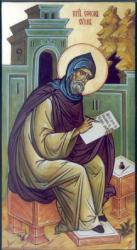
303 - 373 Person Name: Ephraim the Syrian, c. 306-373 Scripture: Isaiah 1:12-17 Author of "Strengthen for service, Lord, the hands" in Common Praise Ephraem Syrus. About A.D. 307 there was born at Nisibis, in northern Mesopotamia, Ephraem or Ephraim Syrus, the most celebrated father of the Syrian church, and famous not only as a theologian, but also as a poet and hymn-writer. Historians differ as to the details of his life; but it is known that having first been a pupil of James, bishop of Nisibis, he finished his education at Edessa, where for the rest of his days he chiefly resided. He visited Basil at Caesarea, in Cappadocia, and by him he was ordained to the office of deacon. He died at Edessa in June, 373. Ephraim was a most voluminous writer of commentaries, expository sermons, hymns, and metrical homilies. Metrical Homilies, first mentioned in connection with him, are a peculiar kind of composition, to which we know of nothing in other literature exactly similar. The tracts in verse explanatory of the Christian religion, circulated by missionaries in some parts of India, and which the people like to read aloud in a kind of chant, seem most nearly to resemble them. The Homilies are in metre, i.e. in lines containing a fixed number of syllables, e.g. 4, 5, 6, 7, 8, or 12, as the case may be, and are divided into strophes, but differ from hymns proper in their greater length and more decidedly didactic character. We might have supposed them to be poems intended to be simply read, but from notes found on manuscripts giving directions as to the singing, it appears as though, at least in some cases, they were actually sung or chanted in connection with religious services. In neither the hymns nor the homilies is any regard paid to accent or quantity, and only occasionally does there seem to have been an attempt at rhyme or assonance. The main characteristics of Syriac poetry are (1) a certain elevation of style, (2) division of the verses into strophep, and (3) the use of lines or verses with a fixed number of syllables
The poetical compositions of Ephraim, so far as printed, are as follows, beginning with his works edited by J. S. Assemani and P. Benedict at Rome, in 1732-46.
(1) Eleven metrical expositions, in heptasyllabic and pentasyllabic metre, of portions of Scripture treating of the Creation, the Temptation of Eve, the Mission of Jonah, and the Repentance of the Ninevites. The last-named is the most striking and the longest, extending to between 500 and 600 strophes of four lines each. Of the use made of it by the Nestorian Christians of the present day we shall speak in the second part of this article.
(2) Thirteen discourses on Christ's Nativity. These are of various lengths and metres. The last is tetra-syllabic, in strophes of 10 lines, every tenth line being a doxology. The life of Christ is supposed by the author to have extended to thirty years, and to every one of these years is assigned an act of praise from some created beings, beginning with the cherubim in the first year, and ending with the dead who have lived again, the living who have repented, and heaven and earth, which through Christ have been reconciled, in the thirtieth. Dr. Burgess says that this is "a very beautiful production, tastefully conceived, and carried out in a masterly manner."
(3) Next come 56 homilies in various metres against "False Doctrines," especially those of Bardesanes, Marcion, and the Manichaeans. Elsewhere we are told that it was Ephraim's desire to counteract the influence of these heretical songs, as well as to provide a substitute for profane games and noisy dances, which prompted him to compose hymns and train choirs, " in the midst of whom he stood, a spiritual harper, and arranged for them different kinds of songs, and taught them the variation of chants, until the whole city was gathered to him and the party of the adversary was put to shame."
(4) Then follow 87 homilies against Rationalists or Free Thinkers, in which occur many curious and highly artificial arrangements of metres. These are succeeded by a collection of seven homilies, forming a separate work, entitled "The Pearl, concerning Faith." This poem is tetra-syllabic, in strophes of 10 lines each, and highly fanciful in conception, though not without pas¬sages of beauty. A pearl is treated as suggestive of truths connected with Christ and His Church.
(5) Four other controversial homilies follow, after which come the pieces which may be more properly called Hymns. Of these perhaps the most interesting are 85 relating to "Death," apparently intended to be used in funeral services
(6) This collection of Funeral Hymns is followed by four short pieces on the "Freedom of the Will," the strophes of which have an alphabetical arrangement, like the Hebrew of the 119th Psalm. The succeeding 16 homilies have the general title "Exhortations to Penitence," but among them are found morning and evening hymns, and a hymn for the Lord's day.
(7) Next come twelve homilies on the "Paradise of Eden," and finally, in the Roman edition of Ephraim's works, 18 discourses on various subjects in pentasyllabic and hexasyllabic metres. But in 1866, Bichll pub. "Carmina Nisibena," 21 in number, the subject of most of them being the struggle between the Persian monarch, Sapor, and the Romans. The rest are on the "Overthrow of Satan," the "Resurrection of the Body," and kindred topics.
In 1882 and 1886 Lamy published 2 vols., entitled S. Ephraemi Syri Hymni et Sermones, containing hitherto unpublished metrical homilies and hymns, on the Epiphany, the Nativity, the Blessed Virgin, the Passover, the Crucifixion, the Resurrection, &c.
--Julian, John A Dictionary of Hymnology, 1907
St. Ephraem, Syrus


